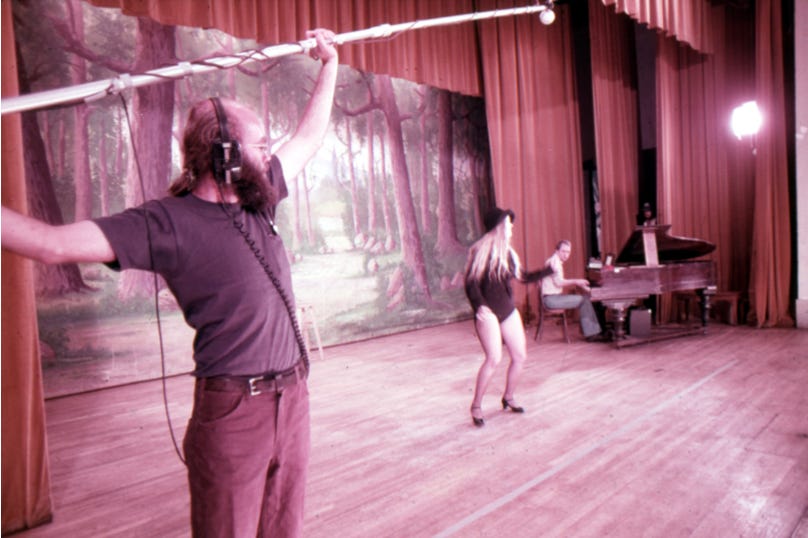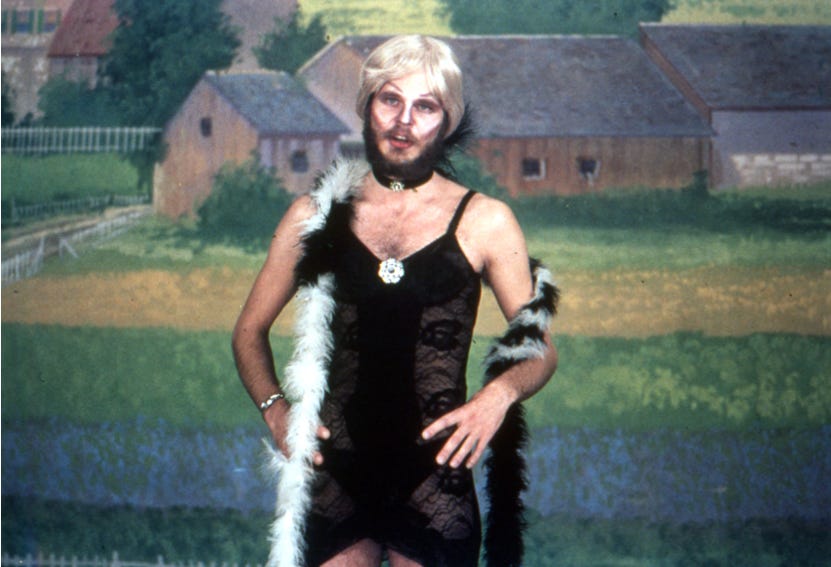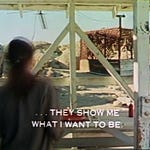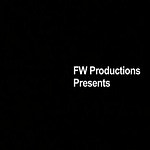(Text below excerpted from my book, THE FILMS OF RICK SCHMIDT 1975-2015)
1988-THE REMAKE
“Director's Statement” by Co-Writer/Director Rick Schmidt discusses the making of Showboat 1988.
Almost 50 years ago, I used an American Film Institute grant to shoot a movie that took place in and around an audition, featuring a librarian (played by actor Ed Nylund – a librarian in real life) trying to remake the musical Show Boat. The fates took hold of what was intended to be a small affair. I originally looked into small community playhouse stages, expecting to shoot on some small stage with a melodrama unfolding. After I was unable to get access to a local playhouse, I ended up renting the cavernous California Hall, right on Polk Street in San Francisco. A poster for the filming, produced by my design friend Joe DiVincenzo, advertised for UNDISCOVERED. “Professional, Amateur, Strange, whatever your act is...” (catch-phrases he and his advertising buddies in San Francisco concocted).
The final ingredient, that packed hundreds of hopeful auditioners into the hall in San Francisco, was when Ant Farm collective member, Doug Michaels, who did a performance artwork called “Media Burn” earlier that summer in San Francisco (1975) with artists Chip Lord and Doug Hall, loaned me their media list, arming me and Joe with the most up-to-date media contacts for our Press Releases.
At the shoot, I eventually had a small army helping me––friends helping street people fill out and sign Movie Actor Releases forms at the door (I have over 1000 of these “permission” documents...), actors acting as “movie people.” playing their parts while sitting at a table with Ed, along with professional gaffers; techs lighting and changing camera rolls of 16MM film as I shot. Fortunately, an art patron friend saved the third and final shooting night, with a last-minute investment for more filmstock.
And the three co-scriptwriters (Henry Bean, William Farley, Nick Kazan), added their two- cents, helping me conceive scenes as well as entertaining their moral doubts about the auditioning process itself (see end "riot").
When the feature was finally completed–– three years of tortuous money-running-out editing later, and achieving a World Premiere at the prestigious Whitney Museum of art in NY, I was threatened by lawsuit from MGM and the estates of Jerome Kern, Oscar Hammerstein, and Edna Ferber. At the tail end of the Whitney run I got a strange message from a film curator at the Museum that there was something important happening and that I needed to come in and see him. I might have thought the news could be something positive, except for the weird tone of voice in the message. Now what? I wondered. When I met the assistant curator he handed over a telegram from MGM, and The estates of Jerome Kern, Oscar Hammerstein, and Edna Ferber, saying that the Whitney Museum had been ordered to “Cease and Desist” from further screenings of my film, Showboat 1988- The Remake. Luckily, the run had just ended, making the order moot. Still, it looked like I was in some hot water.
These established “pillars of show business” cited flagrant use of Show Boat references, songs from the play and movies (such as Old Man River), and made it clear that they wouldn’t accept anything less than total and complete capitulation. These Show Boat owners had used their massive combined legal power to snuff out the life of my little parody. I thought their overkill legal tactics were rather humorous until I got word from my lawyer, Peter Buchanan, back in San Francisco, that my distribution deal with New Line Cinema was suddenly dead in the water.
The distribution company had written a terse note back to the lawyers for MGM, saying that they didn’t handle films with legal problems and weren’t handling mine, posturing as if they’d never had my film under contract. Suddenly there was no chance of recouping any money .
SELF-CENSORSHIP (1979)
Showboat 1988-The Remake was dead in the water, had been killed off by MGM and those other show business estates. My lawyer told me that I had definitely got their attention when he examined the “Cease and Desist” order. He said that I was dealing with the heaviest attorneys in show business, by virtue of the fact that these estates were among the wealthiest. The song “Old Man River” from Show Boat still earned a million dollars a year in royalties. I had tampered with the holy grail of show business, the 1951 film version with Ava Gardner having been one of the largest money grossers in MGM’s history. I had fucked with the man. Still, I wanted my film to be shown, like any artist would. When my filmmaker friend, William Farley, heard about my legal problems he told me I should talk to his art buddy, Dan O’Neill, whose comics had been attacked by Disney for his lewd portrayal of Donald Duck and Mickey engaging in “the act.”
I called Dan and he graciously gave me the name of his San Francisco attorney, Thomas Steel, whom I met with the following week. After showing Tom my film on video, I took notes as he went over the legality, or lack of such,ofeachsceneorsectionofmyfilm. He began by explaining that “a parody can take no more from the original than is necessary to conjure up the image of that original.”
Tom said it was a shadowy line, and that most of the points would have to be fought out in court. By the time he finished talking, it seemed like the whole film was screwed. I couldn’t use the title, because it used the “Showboat” word. I couldn’t use any references to Show Boat, any names or characters from the original. I couldn’t use the few songs included from the audition either.
It seemed that I was totally checkmated.
In the next few days I read a filmmaking book on the history of the movie business, how some of the early pioneers combated unexpected problems with their early film projects, and through fortitude, survived. I learned that producer Sam Goldfish (later known as Goldwyn) ran into great difficulties with his first feature, The Squaw Man, when the various film stocks he used in 1914, unbeknownst to him, had different-sized sprocket holes, making the combined results unprojectable. By sheer guts and willpower (and the right connections) he turned this disaster into a triumph, discovering a way to successfully reprint to one master copy. OK! I needed to do the same thing, turn my film producing problems around.
I slept on it, and slept on it. Then one morning I woke up a little smarter than the day before. Looking over Tom’s long list of “Dont’s,” reviewing all the scenes with questionable legal problems, I got an idea. What if I censored the film myself, I wondered? Wouldn’t that take away any further threat by the Show Boat people? That seemed like a good Kung fu move––to use their own force against them. I could begin the new version of the film with attorney Tom Steel, shot on video (with an American flag as backdrop, of course), explaining what he told me concerning the laws of parody, about the “shadowy line” and how a poor filmmaker couldn’t afford to engage in a legal battle against large corporations such as MGM.
Tom Steel, attorney, appears at the front of Showboat 1988, to explain "the laws of parody in America," and why the film has beeps and honks/subtitles for Showboat material. (His speech follows several acts): <He would declare that I could now show my film only because of complete and total censorship. He would inform the viewers that they should expect to hear bleeps and honks where references to Show Boat were deleted, and see subtitles (my old filmmaking forte) identifying silent stretches where songs had been deleted. The new title of the film would be (censored) 1988-The Remake.
Tom agreed to appear in my film, did a great job on-camera, and it was fun to chop Show Boat words out of my sound track, and delete songs, which would at times force the viewers to sit through a couple of minutes of silence in a theatre. I hoped that those silent stretches would add another dimension to the film, perhaps give the audience some time to think in the middle of the audition madness. And, as I suspected, my film about Ed Nylund trying to “add the stench of death to the musical comedy form” (as he put it) actually became a better film! It now had the bite of real-life drama imposed upon it, in juxtaposition to its fabricated scenes and real audition footage.
For my showing at The Museum of Modern Art in New York, for which I was flown in as part of their monthly in-person Cineprobe series, J. Hoberman at the Village Voice gave the film, now listed as just 1988, a special mention in their “Best of the Week” highlighted events calendar. When the film showed at the San Francisco Cinematheque later that year, Programmer Carmen Vigil wrote a great program note:
“The film loses nothing as a result of his self-censorship, in fact gains by this addition of political dimension, thereby dramatizing the predicament of the independent filmmaker in the industry- dominated film world. This black satire has all of a sudden acquired a biting edge.”
MIKE MIDEKE RECORDS SOUND AS “BOOM MAN.”
This CENSORED VERSION was accepted at the London Film Festival later, in 1980 and was ultimately purchased by Channel Four in the UK, screening to 330,000 Londoners on a prime-time Friday night. Perhaps that's where it morphed into England's Got Talent, American Idol, The Gong Show, America/UK’s Got Talent, The Voice etc. (Just look for four judges at a table––same as my feature. And in each case, each reality TV showcase, there is one overly-abrasive judge––that’s our Showboat 1988 character, played to perfection by Skip Covington).
***
reviews for (Showboat) 1988-The Remake
“1988 in its cumulative preposterous flummery is a spirited outcry for people to throw off the covert and overt forms of oppression and be themselves. Beneath the film’s Quixotic humor and surprisingly touching pathos stands the surrealist belief that art is never more important than life. An outrageous tour-de-force.”––Vic Skolnick, CINEMA ARTS CENTRE
“With this film the tradition of the independent cinema's mock-Hollywood humor is turned inside out.” ––B. Ruby Rich, CHICAGO READER
“It's the greatest extravaganza of the improbable, the bizarre, and the merely mediocre gathered together for the first time anywhere, anytime, on any stage.”––Tom Baglien, MINNEAPOLIS STAR
“Hollywood has made three versions of Show Boat boat, but none of them are remotely like SHOWBOAT 1988.” ––Bob Lundegaard, THE MINNEAPOLIS TRIBUNE
“The big hit of the Ann Arbor Film Festival, it’s easy to see why. The film has carved a unique niche for itself somewhere between FREAKS and Fellini's 8 1/2. It’s as though someone forgot to lock the studio door and Luis Bunuel and William Burroughs sneaked in and began a hatchet job on Hollywood."––David Harris, BOSTON PHOENIX
“The tryout sequences are both delicious and dismaying, reminding us in poignant moments of A Chorus Line and (more often) in silly moments of the tryouts in Mel Brooks' The Producers.”––David Elliot, CHICAGO SUN TIMES
“It could be a monster the way Variety uses the word, or the way Mary Shelley did.” ––Jon Carroll, VILLAGE VOICE
“Schmidt's cutting is right on the money, from news to color video to black and white. He spins around his various stories like a narrative Nureyev.”––Phil Anderson, MINNEAPOLIS READER
“The varied interpretations of Ol’ Man River reprised throughout support my hope that this ballad will some day replace The Star Spangled Banner as our national anthem.” ––J. Hoberman, VILLAGE VOICE
“The film raises questions about exploitation, entertainment, politics, psychology, and the nature of the medium itself.”––Michael Brown, BOSTON EVENING GLOBE
“It is almost guaranteed to be one of the most unusual and moving films ever made.” ––Susan Rumsey, ENTERTAINMENT NEWS
“Laugh more than you have ever laughed before...one of the discoveries of the festival.” ––FILM INTERNATIONAL FILM FESTIVAL, ROTTERDAM
“1988 recounts the fictitious tale of a middle-aged librarian’s attempt to finance and remake the film musical “Showboat” in contemporary terms. The auditions are arranged on a San Francisco stage, and range from incredible to merely bizarre.” —VARIETY
“The film was originally titled, Showboat 1988: The Remake. However, in answer to objections from Metro-Goldwyn-Mayer Inc., director Schmidt deleted all references to the play or novel (“Show Boat” by Edna Ferber). Schmidt actually staged open auditions in San Francisco’s California Hall for the alleged remaking of “Showboat.” As in “A Chorus Line,” the auditions are the heart of the story, except in “1988” those who try out are not just show-business types, they represent a microcosm of American society, from the elderly couple who dream of dancing on the “Lawrence Welk Show” to a bearded transvestite in a tutu. By saying: Write your own fantasies in celluloid,” the film examines our voyeuristic national tendency, which is evidenced by all those who want to appear on television game shows, of needing the validation of an audience in order to perform our lives. Unlike the material from which it borrows, “1988” strips away the structure of its fantasies, leaving the audience as well as the performers naked and vulnerable. Courage to those who can live without dreams.”
––Linda Gross, LOS ANGELES TIMES
————
“Showboat 1988 is a rough unfinished project that reanimates the sentimental tradition because its death or attrition would be a tragic blow to the collective life drive. The series of auditions the film stages run the gamut, affectively and generically speaking, A man mimics a garbage disposal and other sound effects from ordinary life that he says that he developed to entertain his unhappy mother; and angry punk refunctions “Ol Man River” (which keeps on rocking along) to reflect contemporary conditions of structural suffering and the rage of youth at corporate homogenization; drag and bio-women perform female complaints (“I’m just a housewife, a lonely housewife”); lesbians sharing a pair of pants sing romantic vaudeville ironically; the magnificently awkward come up one by one to declaim poems of birth, death and love; there is tap-dancing (a father with his young daughter; a man in a turtle suit; a woman in a nun’s habit who dances with her dog and strips while she taps). Little of this is expressive in any referential sense: the lyrics barely matter. The claim is in the body taking up time, and space. What is important is that many versions of nobodiness are revealed in their singular and yet generic, impersonal, non- autobiographical somebodiness.” ––Lauren Berlant, “THE FEMALE COMPLAINT,” The Unfinished Business of Sentimentality in American Culture,” ©2008 Duke University Press (pages 265-279, “Overture/Aperture: Showboat 1988.
————-















Share this post